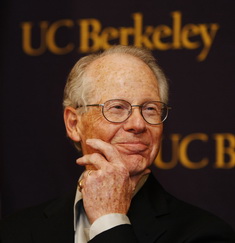Introduction to Oliver E. Williamson

Oliver Eaton Williamson was born on 1932 in Superior, Wisconsin. He studied management as an undergraduate, earned a master’s degree in business administration and followed to achieve a PhD. in economics from Carniege Mellon Institute. He worked as a teacher at The University of Pennsylvania, Yale and Berkeley where he retired in 2004.
Throughout his career he was also a consultant to the U.S Department of Justice, the Federal Trade Commission, and the National Science Foundation. He is notoriously recognized for his research and was awarded the Nobel Prize in 2009 for his analysis of economic governance.
Work
He analyzed the transactions costs within firms and between firms (market). “When should decision power be controlled inside an organization, and when should decisions be left to the market.”
Williamson argued that if the transactions costs are higher on the market than they would be for the firm to produce it, the firm might as well produce it itself. An example is a coal mine and a railroad line. Once the railroad is built, the owner of the mine might as well own the railroad line. In this case, the vertical integration should not be considered a way to acquire market power, but instead it increased the efficiency.
Takeaways
I did not know who Oliver Williamson was previously, but am glad to come across such an impactful economist. His academic path really surprised me since Williamson started his career studying management and then business administration. I believe his work charged the way the FTC deals with vertical and horizontal mergers and think we will use his learnings throughout the semester when discussing transaction costs as well as social welfare.
Sources:
https://www.nobelprize.org/nobel_prizes/economic-sciences/laureates/2009/williamson-facts.html
http://www.econlib.org/library/Enc/bios/Williamson.html
https://www.britannica.com/biography/Oliver-E-Williamson
Williamson is one of the economists we will feature in class on Tuesday. He is one of the primary contributors to the field. He is a little bit harder to read than some others. Nevertheless, you might enjoy getting to know some of his work.
ReplyDelete